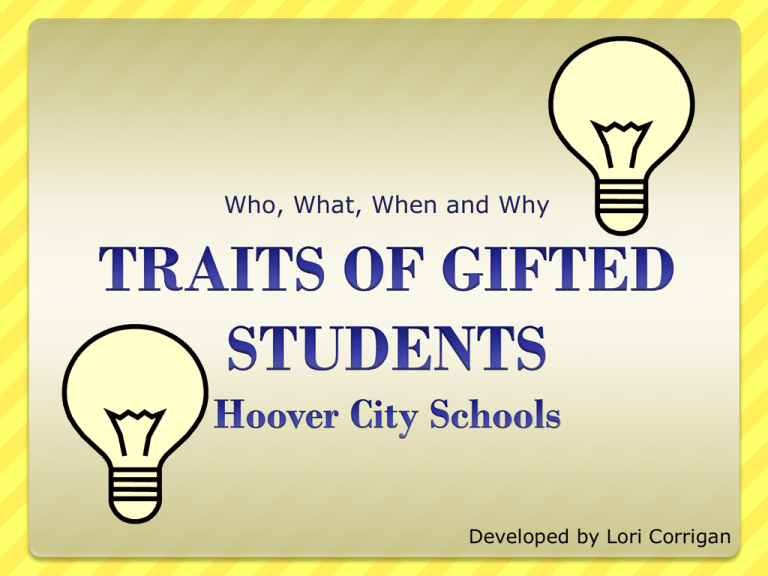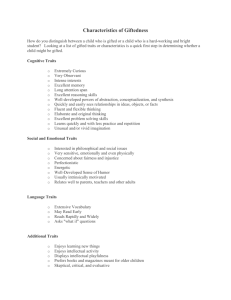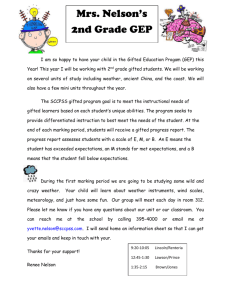Presentation
advertisement

Who, What, When and Why Developed by Lori Corrigan Gifted Children in Schools? Quiz This person was four before he could speak and seven before he could even read. This person had difficulty in school because he stubbornly refused to do anything but paint. This person was told by his teachers he was too stupid to do anything. A newspaper editor fired this person because he had “no good ideas”. Quiz This person was four before he could speak and seven before he could even read.- Albert Einstein This person had difficulty in school because he stubbornly refused to do anything but paint.- Pablo Picasso This person was told by his teachers he was too stupid to do anything.- Thomas Edison A newspaper editor fired this person because he had “no good ideas”.- Walt Disney Are we able to read children correctly and recognize their gifts and talents? Goals Today... Examine the characteristics and behaviors of gifted children in order to better recognize their gifts and talents Learn ways to meet needs in the regular classroom Who are the Gifted? “Intellectually gifted children and youth are those who perform at high levels in academic or creative fields when compared to others of their age, experience, or environment. These children and youth require services not ordinarily provided by the regular school program. Children and youth possessing these abilities can be found in all populations, across all economic strata, and in all areas of human endeavor.” (Alabama Admin. Code r. 290-8-9-.14) How do we serve our students in Hoover? Schoolwide Enrichment Model Model created from the belief that giftedness consists of interaction among three basic clusters of human traits: Above Average Ability, Task Commitment, and Creativity Gifted and talented are those who possess or are capable of developing this set of traits and applying them to any valuable area of human performance. No one cluster alone constitutes giftedness Above Average Ability Task Commitment Creativity IQ Levels Explained Bright- 115 and above Gifted-130 and above Highly Gifted-145 and above Exceptionally Gifted- 160 and above Profoundly Gifted-175 and above Common Traits of Gifted Children Info from: http://www.giftsforlearning.com/traits.htm Very observant noticing details other children of the same age would miss, including non-verbal cues Extremely curious – about objects, ideas, situations, or events May learn to read early - often before age 5 (whenever they do learn to read, they learn quickly). Will read rapidly and widely, after learning to read More Traits… Large and sophisticated vocabulary - enjoys using new and unusual words Excellent memory often have a large storehouse of information about a variety of topics, which they can recall quickly Long attention span compared to other same-age children Excellent reasoning and problem solving skills Intense interests More Traits… Unusual and/or vivid imagination Interested in philosophical and social issues -- for example, the nature of the universe, the problem of suffering in the world, environmental issues Very sensitive, emotionally and even physically - can become upset easily, even over seemingly minor issues (like the feeling of seams in socks), but can be moved almost to tears by the beauty of a sunset or a song. They may also want to quit eating meat out of sympathy for animals. More traits… Concerned about fairness and injustice -- very aware of rights and wrongs Energetic , sometimes needing less sleep than other same-age children (sometimes high energy level is confused with ADHD) Asks "what if" questions - showing ability to construct hypotheses Well developed sense of humor Perfectionistic Things you may observe…. Learn quickly and with less practice and repetition Usually intrinsically motivated to learn Enjoy intellectual activity, thriving on intellectual challenge (can get bored with slow instructional pace and repetition) Relate well to parents, teachers and other adults (often prefer company of older children and adults over same-age peers) Enjoy learning new things, seeking information for its own sake as much as for its usefulness More observations…. Have well-developed powers of abstraction, conceptualization, and synthesis Display intellectual playfulness, which shows up in a desire to fantasize and imagine Prefer books and magazines meant for older children (many prefer non-fiction to fiction, including biographies, but like mysteries and detective stories) Skeptical, critical, and evaluative, making them quick to spot inconsistencies Bright vs. Gifted by Janice Szabos (http://www.bownet.org/besgifted/brightvs.htm) BRIGHT Knows the answers Is interested Is attentive Has good ideas Works hard Answers the questions Top group Listens with interest Learns with ease 6-8 repetitions Understands ideas Enjoys peers Grasps the meaning Completes assignments Is receptive Copies accurately Enjoys school Absorbs information Technician Good memorizer Is alert Is pleased with own learning Enjoys straightforward, sequential presentation GIFTED Asks the questions Is highly curious Is mentally and physically involved Has wild, silly ideas Plays around, yet tests well Discusses in detail, elaborates Beyond the group Shows strong feelings and opinions Already knows 1-2 repetitions for mastery Constructs abstractions Prefers adults Draws inferences Initiates projects Is intense Creates a new design Enjoys learning Manipulates information Inventor Good guesser Is keenly observant Is highly self-critical Thrives on complexity All children have gifts, but not all are gifted. Potential Classroom Challenges Perfectionism Perfectionism can lead to fear of failure, in turn causing a gifted child to avoid failure by refusing to even try something (including doing a homework assignment!) Other students are so obsessed with doing things to meet their own high standards that it leads to “meltdowns” when they think they will fall short Potential Classroom Challenges Super Sensitivity Intense sensitivity can cause gifted children to take criticism, or even general anger, very personally. Childhood slights do not roll off their backs. Sensitivity and well-developed sense of right and wrong can lead to concern over wars, starving children, pollution and other injustice and violence. If they are overloaded with images and discussions of these issues, they can become introverted and withdrawn or even suffer from "existential depression." Potential Classroom Challenges Asynchronous Development Asynchronous development allows gifted children to intellectually understand abstract concepts but be unable to deal with those concepts emotionally, leading to intense concerns about death, the future, sex, and other such issues. Asynchronous development can also result in frustration when a gifted child's physical development leads to an inability to complete a task the child is capable of intellectually envisioning. Asynchronous development also causes a gifted child to be able to participate in adult conversations about issues such as global warming or world hunger one minute and the next minute cry and whine because a sibling took a favorite toy. Potential Classroom Challenges Advanced Verbal and Reasoning Ability Advanced verbal and reasoning ability can lead a gifted child to be argumentative and/or manipulative. Sophisticated vocabulary and advanced sense of humor can cause gifted children to be misunderstood, which can make them feel inferior and rejected. (This is one reason gifted children prefer to be around older children and adults.) Potential Classroom Challenges Imposter Syndrome The “imposter syndrome” strikes people everywhere, especially high achievers. It makes them discount their success attributing it to luck, not real ability. Along with it comes the fear that anytime they could be found out. The more successful you get, the greater the inner stress. Now people have expectations of you that you may not be able to meet. Now each decision you make should be perfect because there’s much to lose." -Simran Bhargava What Gifted Kids Need A place where they can be themselves. A place where they feel supported. Programming (see next slide) that meets their needs that is meaningful, challenging and rewarding. Opportunities in the classroom to learn on their own; at their own pace; work with abstract concepts; study things they are interested in; work with peers who share their interest and abilities and opt out of work they already know and understand... Variety of Programming Options... (which are by-the-way applicable for use with ALL learners!) Curriculum Compacting-Adjusting instruction to account for prior student mastery of learning objectives. Tiering-Designed to instruct students on essential skills that are provided at different levels of complexity, abstract-ness and open-endedness. Learning Contracts- An agreement by the teacher and student, where the teacher specifies the skills that need to be learned along with the activities to be completed with a specific timeline in mind. Choice Boards-variety of activities that students complete as they learn a skill. They can be organized with choice in mind. ...and more Bloom’s Taxonomy Tic-Tac-Toe MenuUtilizes the thinking taxonomy Challenge Boxes-Boxes that contain thinking challenges based on choice and interest Book in a Box- Boxes designed to share a favorite book, develop a product, and involve the audience! It is important to remember that gifted kids come in all different packages. They have different strengths, weaknesses, and interests. The one thing they all have in common is wanting the opportunity to learn something new each day they walk into school, rather than hearing things they already know. One can never consent to creep when one feels an impulse to soar! – Helen Keller




